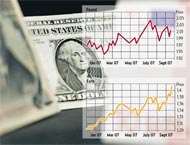Singapore mulls the use of national reserves to tackle recession
 Singapore - Singapore is considering the use of its national reserves this year to provide a muscular response to the deepening economic recession, especially to help cut business costs and save jobs, according to news reports on Monday.
Singapore - Singapore is considering the use of its national reserves this year to provide a muscular response to the deepening economic recession, especially to help cut business costs and save jobs, according to news reports on Monday.
The city state's Senior Minister Goh Chok Tong said this would be the first time ever that the government would dip into the national reserves, considered sacred cows.
It would be to fund the aggressive pain-relief measures in this downturn, Goh said.
Goh as Prime Minister in 1999 had not touched the reserves even though his government had then faced a budget deficit of 5 billion Singapore dollars following the Asian financial crisis.
"There must be exceptional measures for exceptional times," the Straits times quoted Goh as saying.
"The key issue for us is how to save jobs. Of course, to have economic growth, you've got to stimulate demand. But this time it's a global recession, and it's beyond us. We can do what we can in Singapore, but it's not going to solve our economic growth problem," Goh told reporters on Sunday, as reported by Channel News Asia (CNA).
The government has worked out a constitutionally guarded system on using the reserves as a protection against any misuse by future governments.
The reserves can only be used with the approval of Singapore's president.
"It's a difficult decision, because once you do that you may open the reserves for future demands which may not justify the use of the reserves. So, it's an issue that the prime minister is thinking over very carefully," CNA quoted Goh as saying.
Citing a recent drop in exports, he pointed out that 30 per cent of the cranes at the Port of Singapore Authority were idle.
Almost 40 per cent of the 131 small businesses shut down last year were closed in the last four months. The figure was nearly 25 per cent over the number of similar business failures in 2007, according to another report in the Straits Times.
The government plans to present the 2009 budget on Thursday. (dpa)